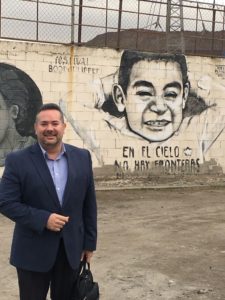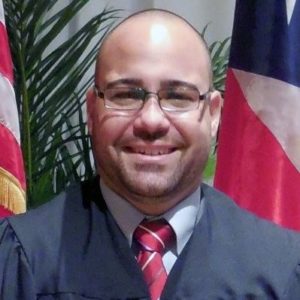The Cooperative Baptist Fellowship has joined “As Born Among Us,” an ecumenical and international network intent on more comprehensively and compassionately ministering to migrants and potential migrants in the United States, Mexico and the Northern Triangle of Central America — El Salvador, Honduras and Guatemala.

Rubén Ortiz, CBF Latino Field Coordinator, stands in front of the border wall, which reads, “In Heaven, there are no borders.”
While the Biden administration now seeks to address the systemic causes of migration in that region, faith-based coalitions have long sought to heal the corruption, violence, poverty and unemployment issues that send migrants northward. Those faith coalitions now are being joined by more American religious and nonprofit organizations, said Ruben Ortiz, field coordinator of La Familia, CBF’s Latino Network.
Ortiz participated in the February 2020 launch of “As Born Among Us,” — “Como Nacido entre Nosotros” in Spanish — with 60 faith leaders from Colombia, Ecuador, Peru, Chile, Argentina, Brazil and Venezuela. Participants were intent on identifying best practices and actions that can be taken to most effectively meet the needs of migrants well before they reach the U.S.-Mexico border.
Ortiz and Elket Rodriguez, CBF’s Texas-based immigrant and refugee advocacy and missions specialist, then participated in the network’s virtual follow-on meeting in April, this time with close to 150 individuals from 18 nations in attendance. Baptists, Catholics, Church of God and Methodists were among the religious groups represented.
“For me, it’s a way to know the nuances and complexities of these challenges, and multiform ways to respond to this issue. It’s an ecumenical approach, too, and one that includes people in the grassroots — churches and organizations,” said Ortiz, whose involvement represented an ongoing effort to integrate the collaborative work of CBF Advocacy, Fellowship Southwest and La Familia.

Elket Rodriguez
Rodriguez, who during the April gathering led a highly attended workshop on safety protocols for migrants, said he was moved and impressed by the social and political commitment shown by Mexican, Central and Latin American churches to serve and advocate for the rights of migrants, often at great risk to themselves.
“Likewise, I was encouraged to see that many Christian leaders have dared to raise their voices for migrants against corrupt governments, even with many financial limitations and very few resources and avenues to advocate,” he said.
Rodriguez’ seminar provided an overview of migrant protection practices in Mexico and the Northern Triangle and covered how the U.S. uses the Migrant Protection Protocols and Title 42 to either return migrants to Mexico to await asylum hearings or to prevent them from entering the U.S. altogether.
“Many of the Christian leaders in the audience didn’t understand what MPP and Title 42 were and how they operated. They also didn’t understand why there was a humanitarian crisis at the U.S.-Mexico border,” Rodriguez said. “I explained that there is a gap between the refugee protection system of the United States and that of Central American countries.”
He advised ministers to explain to migrants that the U.S.-Mexico border is not open, that entrance cannot be achieved for economic hardships alone and to expect inconsistent treatment of their cases by U.S. immigration authorities. Pastors and other religious leaders in the U.S. were encouraged to press Congress for programs focused on solving the root causes of migration including global warming, poverty and corruption.
“Everybody wants to remain and prosper in their own country,” he said.
Participants in the spring meeting issued a pastoral letter urging governments to improve human rights polices and for churches to intensify their collaborative work to help migrants.
The focus of migrant outreach ministries must be about much more than providing food and shelter to people at the border, Ortiz said.
Rodriguez said American churches have much further to go than their Mexican and Central American counterparts in embracing ministry to migrants: “I do not see the same level of commitment from many of our local churches to advocate for immigration reform that responds to the present and future of our country and that meets the humanitarian needs of our neighbors in the south.”
But he also acknowledged that such change takes time. “I learned that many churches go through a gradual process, in which they initially commit to accompany migrants during their emotional, spiritual and physical uncertainties.”
The desire to participate often increases when the biblical imperative comes into focus, he said. “And that’s when churches conclude that our legal structures and political designs produce the unfair conditions that drive migrant families out of their countries. It is then that the churches cross the threshold of immediacy and charity, which is vital, but then begin to associate the work of advocacy as integral to the church’s responsibility of welcoming the stranger and loving our neighbor.”
The focus of migrant outreach ministries must be about much more than providing food and shelter to people at the border, Ortiz said.
The intent of “As Born Among Us” is to educate the church about a “holistic approach” that includes advocacy and nurturing the entire person, he said. “That’s my interest and that’s the work that’s been going on in Central and Latin America for years.”
The network also has plans to develop seminary curricula that will offer certificates in migrant ministry, and to develop educational resources, liturgies and sermon topics for churches fighting against discrimination, he added.
“We need to understand migration as a multi-dimensional issue that has ramifications in many countries. We need to mobilize the church on human rights and to embrace the psychosocial and spiritual approach to caring for migrants,” Ortiz said.
Related articles:
Coalition of evangelical Christians advocates third way on immigration reform
As VP Harris heads to Guatemala, evangelical leaders urge U.S. to address root causes of migration
We cannot now close our border to those fleeing the horror we helped create | Analysis by Chris Conley


